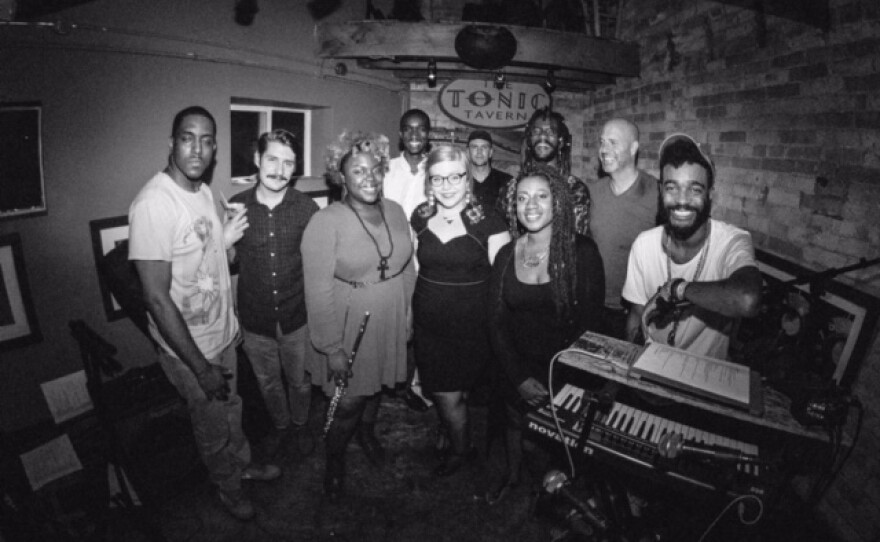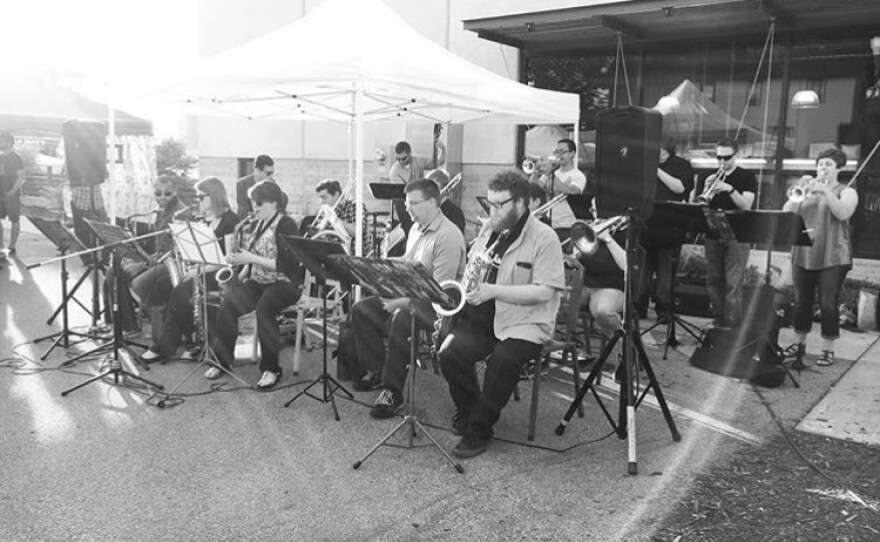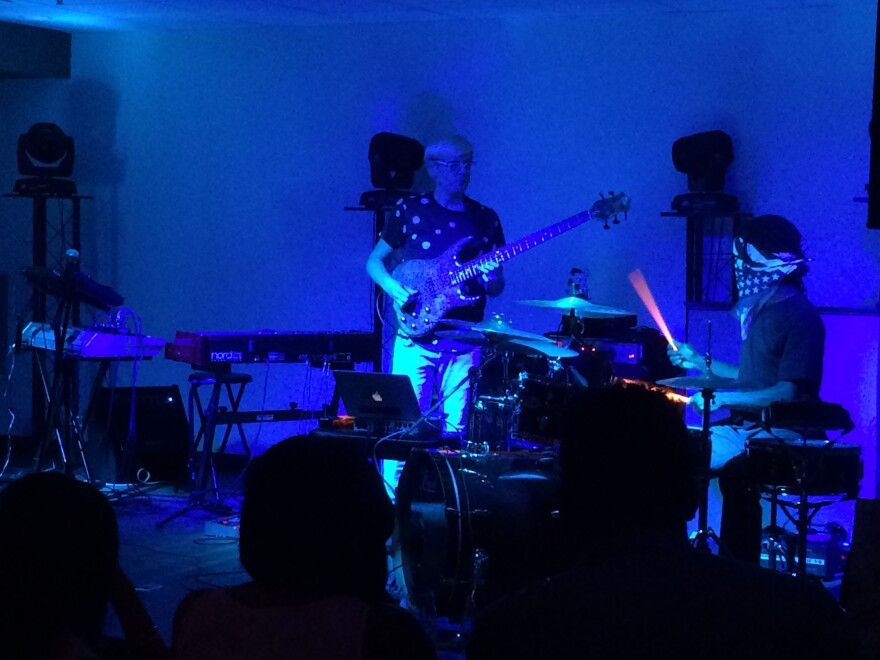(This is the second installment in a two-part series about jazz in Milwaukee. Part one: The Past.)
“One of the proudest moments of my career was during the Miles Davis tribute,” says Black American arts curator and saxophonist Jay Anderson.
“It was when Klassik (Kellen Abston) got on stage and rapped during our version of ‘Bitches Brew’ with Russ Johnson, Ethan Bender, Mark Davis, and Mitch Shiner.”
“Russ is in the mic making weird reverb sounds
While the marriage of hip-hop and jazz is decades old, contemporary artists such as Kendrick Lamar and BADBADNOTGOOD are brilliantly fusing the genres. Local genre-bending bands like Anderson’s Foreign Goods and Rhythm Changes are exposing Milwaukee audiences of all ages to jazz elements.
Anderson, 24, is an important figure in the modern Milwaukee music landscape because he is a bridge between the jazz old guard and the young, dynamic, multi-genre music scene in Riverwest.
The moment Anderson described took place at Company Brewing during a special edition of their Supper Club Jazz series. The Riverwest restaurant and microbrewery is one of a handful of venues that began hosting live jazz in the wake of the Jazz Estate closing for renovations last year.
The Jazz Estate is part of the storied history of Milwaukee jazz that I explored in the first installment of this two-part series.
Though it has gone through many ups and downs, Milwaukee’s jazz scene remains vibrant thanks to musicians, club owners, educators, promoters and fans. With the Estate reopening tonight, an additional venue (Chic Underground), more on the way, plus the Pabst Theater Group expanding its jazz programming, the great American art form is alive and well in Milwaukee.
THE ARCH OF CITIES
Many of Milwaukee’s best jazz musicians of the 20th Century left town for bigger markets. The scene was a mix of local talent and musicians who fell in love while passing through. Others moved back after stints in New York City. The recent influx of homegrown jazz talent returning to Milwaukee is unprecedented.
“Every city has an arch of a storyline,” proposes Anderson. “In the 20th Century the biggest cities for jazz and live music were New Orleans, New York City, Chicago, and LA. It was cheap and easy to live in those places. That was true up until about five years ago. The reason why is because of gentrification. Rich people want to live in those places because of the image of the arts. It drives the rent up and now musicians can’t afford to live in New York or LA.”
“Now it’s time for places like Milwaukee, Portland, Nashville, Austin, and Asheville to come up. The rent is cheaper and we have budding music scenes,” adds Anderson.
The Internet has also helped to equalize the playing field. If you wanted to study from a jazz master in the 20th Century you had to move to wherever they were. Today we have access to vast archives of live performances, records, basement tapes, tutorials, all at our fingertips.
Foreign Goods // Shiki No Uta // Summer Soulstice 2016 from Emry Brisky on Vimeo.
Saxophonist and educator Aaron Gardner is an example of someone who lived and played in NYC for a decade before moving back to Wisconsin.
“I think in the early 2000s live music took a hit in general with club DJs becoming popular with young people,” muses Gardner. “But I have a feeling that live music is on its way back. People are getting fed up with the over-saturation of the Internet and electronic devices. We are trying to fill up our souls again.”
We are trying to fill up our souls again. - Aaron Gardner
Devin Drobka is a drummer and Milwaukee-native who attended Berklee College of Music in Boston and played in NYC for a few years before returning home.
“I was getting tired of being broke and having a poor quality of life. At the same time I was tired of being from a place that a lot of people thought sucked, in terms of the music scene,” admits Drobka.
Shortly after moving back to Milwaukee Drobka started “Unrehearsed MKE” at the West End Conservatory. It is the longest-running improvised music series in the city. A friend of Drobka’s started a similar series in Baltimore and later a Brooklyn chapter emerged, which is where Drobka first took part.
“It’s about getting out of your comfort zone. Milwaukee is a very comfortable city. Everything is like ten minutes away and people are chill. ‘Unrehearsed’ is a way for people to get together, improvise and create community,” says Drobka.
Unrehearsed MKE #46takes place Sunday, November 6 at 7:30 p.m.
The West End Conservatory offers private music lessons and a jazz guitar ensemble. The WEC recently added big band drummer Michael Sulcer to their faculty. On Friday, November 4, Sulcer will perform with Neil Davis on guitar, Isaiah Joshua on alto saxophone and Mitch Cooper on bass and keyboards. This all-ages event runs from 7:30 p.m. to 9:30 p.m. at the West End Conservatory.
THE INSTITUTE & THE SUPPER CLUB
Milwaukee’s flagship jazz studies program is housed at the Wisconsin Conservatory of Music (WCM) on the Eastside. It was founded by Tony King and Manty Ellis in the early 1970s and today is led by pianist Mark Davis.
The WCM’s Jazz Institute is a program for middle school through adult-aged students, offering private lessons, classes, and ensembles. They also run a jazz camp in the summer that attracts youth from all over the area.
“A focal point for us is the high school programming,” says Davis. “We have been involved in competitions and traveled a bit over the last several years. We also have students that are business people and professionals in other areas. They have successful careers already but they want to pursue studying jazz.”
“I think there’s a stylistic musical thread that has run through Milwaukee jazz musicians,” suggests Davis. “Maybe some of that is being lost in the younger generation because of YouTube and what not, but that’s natural. I’m just glad to see that there are young players who are ambitious and working hard to develop their music.”
Russ Johnson is a Racine-native who played trumpet in NYC for more than two decades. He is arguably the most accomplished jazz musician currently based in Milwaukee. In between family life and professor duties at UW-Parkside, Johnson gigs all over the world. I spoke to him over the phone from his cottage in Pennsylvania. (This Friday November 4, Johnson will perform an improvised set with acclaimed NYC bassist Max Johnson and percussionist Tim Daisy at Acme Records in Bay View.)
“As soon as I was old enough to drive I would go up to Milwaukee and down to Chicago,” recalls Johnson. “I used to go to jam sessions at the Jazz Estate. One of the big things for the jazz scene since I moved back five years ago was losing the Estate. It was a place where everyone got to hang, which is a big part of jazz culture.”
The Estate’s temporary closing turned out to be a blessing in disguise. With Milwaukee’s central jazz hangout on hiatus various other venues began hosting live jazz, including Company Brewing in Riverwest. Their series — Supper Club Jazz — features a free performance on Wednesday nights along with an original three-course meal designed by head Chef Rosy Rodriguez.
“We reached out to Jamie Breiwick to pick his brain,” says owner George Bregar. “He was helpful in that he knows the jazz scene really well and knows what it needs. Then we brought in Jay Anderson for some extra positive energy. Personally, I like it so much that we schedule our brew nights around it.”
In addition to the Wednesday night performances, Company Brewing also hosts occasional special editions on the weekend. The first special edition was the aforementioned tribute to Miles Davis featuring Russ Johnson on trumpet.
“The Miles Davis show was the archetype of what the series can be,” says Bregar. “We had a full dining room of people eating, but there was also this jazz show happening that definitely delivered.”
Another Riverwest institution that supports live jazz — specifically of the avant-garde variety — is Woodland Pattern Book Center on East Locust Street. Founded in 1979, Woodland Pattern has produced the Alternating Currents and Formations music series for decades.
JAZZ CHAMPIONS
August J. Ray is Milwaukee’s unofficial “jazz super fan.” He has been attending performances since the 1950s and you can still catch him out multiple nights a week supporting live jazz. Ray also donated his record collection to the West End Conservatory.
“In the ‘50s and ‘60s people would actually sit and listen to the music,” recalls Ray. “There was always a little bit of talking, but it was mostly quiet and respectful. You go to a lot of jazz shows today and the music is almost wallpaper. But at the Miles Davis tribute people were paying attention. When you go to events like that it brings back the old days. And I think it’s getting better.”
During my research of Milwaukee jazz one name kept popping up — Jamie Breiwick. A Racine-native, Breiwick has been playing trumpet and supporting jazz in Southeastern Wisconsin his entire life. He has been praised for his innovative instruction and inspired playing. Breiwick is perhaps best known for his work with Milwaukee Jazz Vision (MJV), an organization dedicated to developing and advancing the local jazz community, similar to the efforts of the non-profit Jazz Unlimited.
“MJV was the result of a late night discussion between Neil Davis, Kevin Hayden, Steve Peplin and myself. We were contemplating the state of the scene and decided that rather than whine and complain, we would do something proactive,” says Breiwick.
MJV’s first endeavor was the Eastside Jazzfest in 2010. MJV teamed up with the Riverwest Artists Association in 2011 to revitalize the historic Jazz Gallery Center for the Arts. In 2013 MJV partnered with Summerfest to present a free, one-day jazz concert at the Henry Maier Festival Park known as “Visions on the Lake.”
I attended Visions on the Lake this summer. Breiwick played with the Milwaukee Jazz Orchestra. As soon as he got off stage Breiwick was met by a group of adoring former students.
In 2014 MJV — in cooperation with Bay View Gallery Night — started “Bay View Jazz Fest,” which included 18 bands at 9 venues this summer. I first saw Fred Boswell Jr. — arguably the most electrifying drummer in the city — at BVJF 2015. MJV’s website also hosts the Milwaukee Jazz Archive, which I drew on for the first installment in this series.
“Ultimately, we are trying to raise the profile of the jazz scene through every possible outlet we can,” insists Breiwick.
Milwaukee Jazz Vision’s most recent partnership is with the Pabst Theater Group. Since 2002 the Pabst Group has helped revitalize Milwaukee’s entertainment scene. In the mid-2000s the Pabst Group produced a jazz series that ended in 2009. The addition of The Back Room at Colectivo on Prospect Avenue to their roster of venues has renewed the Pabst Group’s focus on jazz.
“Our CEO Gary Witt spent most of his career working in the recording industry as a marketing professional,” says Pabst Group public relations coordinator Andy Nelson. “He traveled around America working for and consulting with record labels like Warner Brothers, Impulse, GRP, and Concord. During that time he represented a number of jazz artists.”
“Jazz is something that means a lot to him,” adds Nelson. “It’s been difficult ever since Milwaukee lost their last jazz radio station, but in the past year or so there’s been some hope. The Back Room at Colectivo works really well for jazz.”
This fall The Pabst Group will bring Chris Botti (November 17) to the Riverside, Pérez, Patitucci and Blade (November 6), Patricia Barber Trio (November 12), and The Bad Plus (December 15) to The Back Room at Colectivo.
THE REBIRTH OF COOL
In November of 2015 the Jazz Estate was sold to John Dye, owner and operator of Bryant’s Cocktail Lounge since 2008. I spoke with Dye at his acclaimed Southside lounge during a Jazz Estate cocktail preview event.
“It’s always been one of the places in Milwaukee that I’ve been interested in, but they approached me,” says Dye of his new business venture.
“We’re going to do some really nice versions of classic cocktails from the ‘70s and ‘80s, ones that nobody really touches. They’re good drinks, but they’re just a little uninspired,” exclaims Dye. You might say he’s done the same with the Estate.
Opened in 1977, the building fell into disrepair over the years. The Estate’s reopening was originally slated for July, but more renovations were required than anticipated. Given his dedication to preserving history, Dye took his time to get it right. Last week I attended the club’s soft opening and I’m thrilled to report he’s done just that.
As soon as I walked into the Estate there was a “new club smell.” Dye's team polished and rebuilt every inch of the club, adding a mix of design elements from various eras, including a tin ceiling in the front room and a new house drum kit. The vintage looking lights and register give the bar a Bryant’s vibe. The seating and sight lines in the back area are improved as well. And the acoustics are excellent.
The Jazz Estate will feature live music on Thursdays and Saturdays from 8 p.m. to 11 p.m., with cover ranging from $5 to $12 in the first month. There is no cover for the grand opening tonight. DJs and pre-recorded old school soul and jazz will play the rest of the week at the Estate, which is now better than ever.
NEW THREADS & OLD HATS
The Pfister Hotel in downtown claims the longest-running commitment to live jazz in Milwaukee. From the days of the Crown Room and the lobby bar to their current programming at Blu Bar & Lounge and Mason Street Grill, the Pfister has featured jazz for almost a century. Earlier this year a new addition to Milwaukee’s live jazz scene opened just one block north of the Pfister.
Chic Underground is a business venture from Shapree Bourgeois and Rita Willis, who ran Chic Cafe Lounge in the Third Ward for eight years. The Cafe moved next door to the music club, which opened for business in May in the lower level of a mixed use office and retail building at 770 North Jefferson. According to local jazz legend Manty Ellis, Chic’s layout is a replica of a bygone club called Christopher’s.
Local bassist and entrepreneur Timothy Ricketts is managing and booking Chic Underground. Ricketts made a name for himself in the Milwaukee music scene as a founding member of the band Cigarette Break.
“We wanted to offer music in a higher end atmosphere that is not a hotel, but nice like a hotel,” says Ricketts about Chic. “We wanted a stage with good lighting. It’s a different type of energy when a venue is built for music. The food is good, but it’s really about the music.”
The first time I went to Chic Underground was for an event called Bass Day. Organized by Milwaukee musician Kevin Hayden since 2013, Bass Day featured inspired sets from local and national performers in front of a packed house.
When the Milwaukee jazz scene was experiencing lean years in the late 2000s, Kevin Hayden was one of the musicians in town who adapted and persevered.
“I think a lot of jazz musicians don’t transfer their creativity from their instrument to the business side,” suggests Hayden. “If you just want to play, you’ll always get played.”
Two more additions to the jazz scene are planned for the next year or so. Guitarist Evan Christian — a contemporary of Ricketts and Hayden — is set to open a club called Gibraltar on 5th and National. Christian, along with Anderson’s Foreign Goods, Sista Strings and the Kevin Hayden Band, were among the performers at the 4th Annual “Jazz in the Hood” event held in Bronzeville this summer.
A license has been requested for the space that formerly housed Rumor Upbeat Lounge on 1st and Pittsburgh. The proposed business would also feature jazz. In addition, Transfer Pizzeria on 1st and Mitchell hosts live jazz on Tuesday and Thursday evenings. American craft beer bar Sugar Maple in Bay View puts on local and national jazz performances. Plus, the Miramar Theatre’s Stage Right Pub regularly has live jazz.
Caroline’s on 2nd and Florida has been the stalwart jazz and blues venue in Walker’s Point since 2000. I sat down with Caroline Spencer at her club the week that she and her husband Paul bought the building.
“There were some dead times, but the wonderful thing is there has been such a resurgence of interest in jazz by young people,” exclaims Spencer. “It just blows my mind. And this neighborhood wasn’t exactly thriving for a lot of years. But it’s turning into an exciting place to be.”
Another legacy venue is Mr. J’s on West Fond Du Lac Avenue just south of Capitol Drive. The jazz, blues, and R&B lounge is celebrating its 40th anniversary this year. Recently Jay Anderson played with the Avant Soul big band at Mr. J’s for a Lincoln High School Alumni Association event.
THE RENAISSANCE
When 88.9 WYMS changed its format in 2006 Milwaukee lost a jazz institution. That being said, 88Nine Radio Milwaukee has undoubtedly helped elevate the overall local music scene. Programs like Rhythm Lab Radio and Sound Travels regularly feature jazz. In an attempt to fill the void left by WMYS’ format change, 91.7 WMSE launched a 24-hour online jazz stream last year.
“Right now the stream is kind of ad hoc. It’s all styles of jazz, literally on random,” says station manager Tom Crawford. The stream draws from WMSE’s entire jazz library, which took a few years to digitize. WMSE airs programs such as Dr. Sushi’s Free Jazz BBQ, Dewey Gill’s Big Band Show, and Sunday Morning Jazz with Mark, but their jazz stream provides around the clock programming.
“Because it’s random you might hear Sun Ra and then John Scofield, which is kind of cool,” adds Crawford. “The city has always had a really good jazz history and there’s a lot of young guys who are learning their chops. They want to be like Oscar Peterson. They’ve heard The Bad Plus, they see that they’re kind of punky, and these kids are realizing that it’s cool to play jazz.”
One of those kids is 20-year-old local producer Thane, who’s debut album Topia features national hip-hop stars Anderson .Paak, Mick Jenkins, and BJ the Chicago Kid. Topia also features the trumpet playing of Jamie Breiwick. Thane’s manager Jake Kestly reached out to him through social media after discovering Breiwick's music on SoundCloud.
“I've been doing that for a long time with lots of artists,” says Breiwick of the collaboration. “There was a band called Growing Nation here in the early 2000s that I played with. I remember the Rusty P’s were doing stuff with Recycled Future and Andrew Neesely. It's a very natural fit. Hip-hop is a different branch of the same tree, with the same roots.”
In fact, freestyle rap battles stem from jazz cutting contests. Hip-hop/jazz pioneers The Roots are the current house band for Late Night with Jimmy Fallon. Jazz music’s presence in popular culture is on the rise. At the same time our local jazz scene is experiencing an inspired resurgence. Former Milwaukee Journal jazz writer Kevin Lynch will soon publish a new book. There hasn’t been better time in recent memory to be a jazz musician and fan in Milwaukee.
“Jazz asks you to be proficient with your instrument, to know it well, to study it like a classical player so that it's a part of your hand or lips,” Milwaukee jazz legend Al Jarreau proclaims.
“Okay, now that you know it, come and be free. Make your statement. Improvise. You know the changes and the melody, now make a new melody. That's a calling that will always be inviting to a young musician.”



















































































